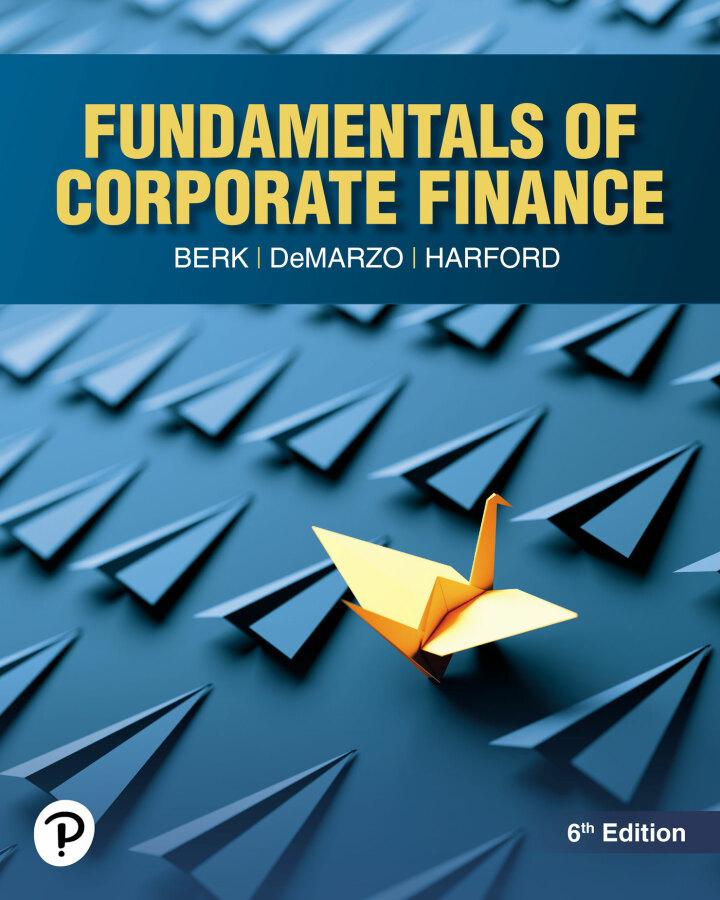Question
You are a very powerful institutional investor that holds 1 million shares of Cisco System, Inc., purchased on September 1, 2015. In researching Cisco, you
You are a very powerful institutional investor that holds 1 million shares of Cisco System, Inc., purchased on September 1, 2015. In researching Cisco, you discovered that they are holding a large amount of cash. Additionally, you are upset that the Cisco stock price has been somewhat stagnant as of late. You are considering approaching Ciscos Board of Directors with a plan to payout half of the cash the firm has accumulated, but cant decide whether a share repurchase or a special dividend would be best. Because both dividends and capital gains are taxed at the same rate (20%), at the first glance there seems to be no difference between the two options. To confirm, however, you need to run the numbers for each scenario. Assume that the current stock price is $47 and the number of shares outstanding for Ciscos stock is 4,240,000,000 shares.
1. Go to http://finance.yahoo.com, enter the symbol for Cisco (CSCO) into the Quote Lookup box.
-
Click Financials, Balance Sheet, Annual, and i) record one-half of the most recent Cash and Cash Equivalents reported on the balance sheet (*Note that this number is in thousands. Multiply this number by 1000 to convert it into dollars). This is the dollar amount of cash available for payout. Using this amount, compute iii) the dividend per share that could be paid in the dividend scenario, and iii) the number of shares that would be repurchased (at the current market price) in the repurchase scenario.
-
To obtain the initial purchase price at which you bought the stock on September 1, 2015, click Historical Prices, enter the date you purchased the stock as the start date and end date, choose Daily frequency, and hit Get Prices. Record the Adj Close price. This is your initial purchase price.
1
-
Lets compute the after-tax payout proceeds that you would receive in each scenario.
-
Find the after-tax payout proceeds you will receive under the dividend scenario.
Taxes you will pay on the dividend income can be computed as:
Dividend income taxes = Dividend per share Number of shares that you are holding Dividend tax rate
-
If the cash is (indirectly) paid through stock repurchase instead, payout proceeds are a little bit indirectly realized. Lets assume that you will make a home-made dividend by selling some number of shares from your initial holdings. The number of shares that you can sell and still maintain the same proportion of ownership before and after repurchase program is 29,629 shares (the number to be given in class). Assuming that you can sell these shares at the current market price, compute the after-tax payout proceeds from this home-made dividend under the repurchase scenario. Note that home-made dividends, unlike actual dividends, are realized by selling stock and therefore are subject to capital gain taxes:
Capital gain taxes = (Selling price Initial purchase price) Number of shares soldCapital gain tax rate
-
-
The calculation in Question 2 reflects your immediate proceeds arising from the payout event itself, but it does not consider the consequences on any remaining shares in your portfolio. To incorporate this feature, you first decide to see what happens if you sells all remaining shares of stock immediately after the payout (either after dividend or after the repurchase). Lets call this liquidation proceeds. Again, note that these liquidation proceeds are subject to capital gain taxes. Also note that the stock price will fall by the amount of the dividend per share immediately after the dividend payment.
-
Calculate the after-tax liquidation proceeds from immediately selling any remaining shares after the dividend scenario.
-
Calculate the after-tax liquidation proceeds from immediately selling any remaining shares after the repurchase scenario.
-
Compute the total after-tax proceeds by adding up after-tax payout proceeds and after-tax liquidation proceed in each scenario, and compute the difference between the two scenarios.
-
Under which scenario would you be better off after taxes?
-
2
-
Rather than selling all remaining shares today, now you decide to consider a longer holding period. That is, you will sell all remaining shares 5 years later rather than immediately. Assume that the stock price will grow at 10% rate per year going forward, regardless of what the starting price is today. Also assume that Cisco will pay no other dividend over the next 5 years.
-
What would be the stock price after 5 years under each scenario?
-
Calculate the after-tax liquidation proceeds from selling remaining shares 5 years
after the dividend scenario.
-
Calculate the after-tax liquidation proceeds from selling remaining shares 5 years
after the repurchase scenario.
-
Note that these liquidation proceeds are occurring at time 5 instead of time 0. Calculate the present value (PV) of the after-tax liquidation proceeds in each scenario using discount rate of 10%.
-
Compute the total after-tax proceeds ( = after-tax payout proceeds + PV of after-tax liquidation proceeds) in each scenario, and compute the difference between the two scenarios, evaluated at time 0.
-
Which scenario would you prefer now?
-
-
Do you think your preference changes depending on your investment horizon? If so, how?
Step by Step Solution
There are 3 Steps involved in it
Step: 1

Get Instant Access to Expert-Tailored Solutions
See step-by-step solutions with expert insights and AI powered tools for academic success
Step: 2

Step: 3

Ace Your Homework with AI
Get the answers you need in no time with our AI-driven, step-by-step assistance
Get Started


